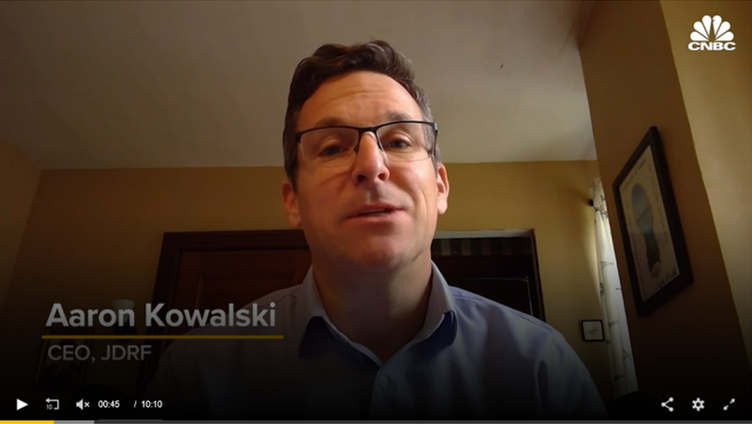
CEO Aaron Kowalski, Ph.D., Shares Needed Perspective
With leading organizations highlighting diabetes as a key risk factor in both contracting and developing serious results from the coronavirus, Breakthrough T1D is working to build a balance of care and concern within the type 1 diabetes (T1D) community.
“The World Health Organization and the CDC putting out a blanket statement that people with diabetes are at higher risk is very scary to people, and I don’t know that it fully paints the real picture of what is happening here,” Breakthrough T1D President and CEO Aaron J. Kowalski, Ph.D., told CNBC News.
Critical, Breakthrough T1D has said, from the early days of the pandemic, is that people with T1D should take extra precautions, but not panic.
In addition to CNBC, Dr. Kowalski has been speaking to and sharing information with NPR in a story titled, How People With Weakened Immune Systems Are Navigating The Coronavirus, in Medium’s story on COVID-19 Is A Bigger Concern For People With Type 1 Diabetes, But Not For The Reason You Think, and on April 3 will join a Facebook Live event to respond to community questions.
Current evidence suggests that individuals with well-managed T1D are not at higher risk of contracting COVID-19.
“Don’t worry about being at 6 vs. 7.3. You are not at any greater risk,” said Dr. Mary Pat Gallagher, director of pediatric diabetes at the Pediatric Diabetes Center at Hassenfeld Hospital at NYU Langone.
“For people who have an A1c of 12, yes, they’re considered high risk, and I am worried about people who have A1cs that are that markedly elevated because I worry that their immune systems are not going to be able to fight this off as effectively as people who have better control.”
Dr. Kowalski, along with leading medical experts, are stressing the need for everyone with T1D to do all they can to stay healthy, and then to aggressively monitor and manage their glucose levels should they become ill.
“If you don’t want to eat or you are vomiting, you need to check your ketones,” said Dr. Anne Peters, director of the University of Southern California Clinical Diabetes Programs and practicing physician. She urges people with diabetes to keep glucose-controlling fluids in the house to help manage blood-sugar levels.
She also urges everyone with T1D to contact their doctor if they think they are ill, so their doctor can monitor their condition, and intervene if needed.
“We are really trying to reassure people with diabetes in a time of incredible fear,” Dr. Kowalski told CNBC. “This is a pandemic the likes of which we have never seen before. We need to stay as healthy as possible. Isolate. Distance. Wash your hands.
“I live with type one diabetes, as does my brother. Taking care of ourselves now is as important as it’s ever been.”